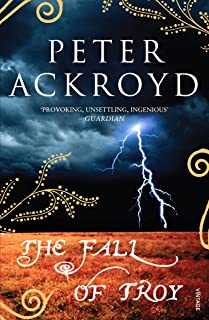There is perhaps no other tale in European culture that synthesises history, myth, literature and perhaps religion as famously and as frequently as Homer’s Iliad. So often has this story of Bronze Age conflict been adapted, one might wonder why an accomplished writer, known for her apposite, pungent and penetrating comment on contemporary society and its issues should turn to it for inspiration. It is a question that recurs throughout a reading of The Silence of the Girls by Pat Barker.
Surely an intentional pun on the similar film title, the substitution of Girls for Lambs, plus the associated allusion to insane slaughter and violence ought to point a reader toward the eventual direction of the book. The fact that this contemporary reality emerges gently and subtly is further evidence of Pat Barker’s profound writing skill. In a less accomplished writer’s hand, this rather blunt concept might just bludgeon the reader’s experience with polemic in a similar way to Achilles’s sword occasionally dealing with heads. But in Pat Barker’s hands, the idea works supremely and subtly.
The Silence of the Girls begins with a victory for Achilles in which a Trojan adversary is defeated and killed before his city is sacked. Men and boys are slaughtered, as well as most of the women, except for those deemed worthy of abduction as slaves, an office that would demand regular calls to duty. Young women thus become the chattel of victory, the spoils to be despoiled at the hands of the brutes, all to be suffered in the submissive silence of slavery.
Briseis is a king’s daughter who loses most of her family in the city’s sacking and it is through her eyes that the story is seen. She herself becomes a prize. Achilles, the half god, half man superhero, is the obvious claimant, but Briseis ends up in the confused clutches of Agamemnon. Achilles mysteriously withdraws from battle, apparently to sulk, and the Greek cause in the war with Troy suffers severely as a result.
Now thus far this might sound like a conventional rewrite of a well-known and well covered story, but Pat Barker’s Silence of the Girls sees events through the eyes of the newly enslaved Briseis and her viewpoint adds much to the familiar territory. It is through her prism that we see an ancient world that is foreign to us but familiar to her. Her observations become interpretations of its customs, beliefs and assumptions. Like Helen, the beauty whose abduction started the conflict, Briseis is young, eligible and marriageable. Unlike Helen, Briseis was already on a losing side and must endure her gender without privilege, though in the bedroom their differences in position might just have been minimal, mere details of posture. While the males enact their increasingly ritualised conflict, Briseis and the other women hold everything together via food, comfort, kindness and tolerance. Their reward is further use, always with the threat of death nearby, if ever the fancy were to wear off.
In the case of Briseis, the fancy of Agamemnon was always in question, like his geography, but Achilles, it seems, regards her as something more than a mere bed-mate, though he seems have difficulty expressing his feelings. A thoroughly modern man, we presume. When Agamemnon gives way and Achilles claims his prize, there develops a bond which might pass for marriage. But somehow, any acknowledgement of a woman’s rights seems to be beyond the imagination of these committed warriors.
And this lack of ability to see self-interest extended by greater tolerance is doubly underlined when, at the end of the conflict, a sacrifice to the gods is needed to ensure a fair wind for the voyage home and this automatically has to entail killing someone who is young, virginal and female. Old habits, no matter how hard-set, simply do not die.
By the end, the significance of the title and Briseis’s relationship with Achilles has thus become clear. Contemporary films and genre fiction still make their point by sensationalising male violence against women, and perhaps relations between the sexes still bear some of the hallmarks that characterised the behaviour of these Bronze Age brutes. The difference, perhaps, is merely one of degree.
The Silence of the Girls is a challenging read, but not
because of difficult language or deviousness of plot. Indeed, like much great
drama, we know what is going to happen in advance, since the story is so well
known. The joy is learning how things happen and how they are interpreted, and
thus the difficulty arises because the reader must operate on different levels
of awareness throughout. To ignore this contemporary parallel would render The
Silence of the Girls just another re-write of an old story, and it is much more
than that.




